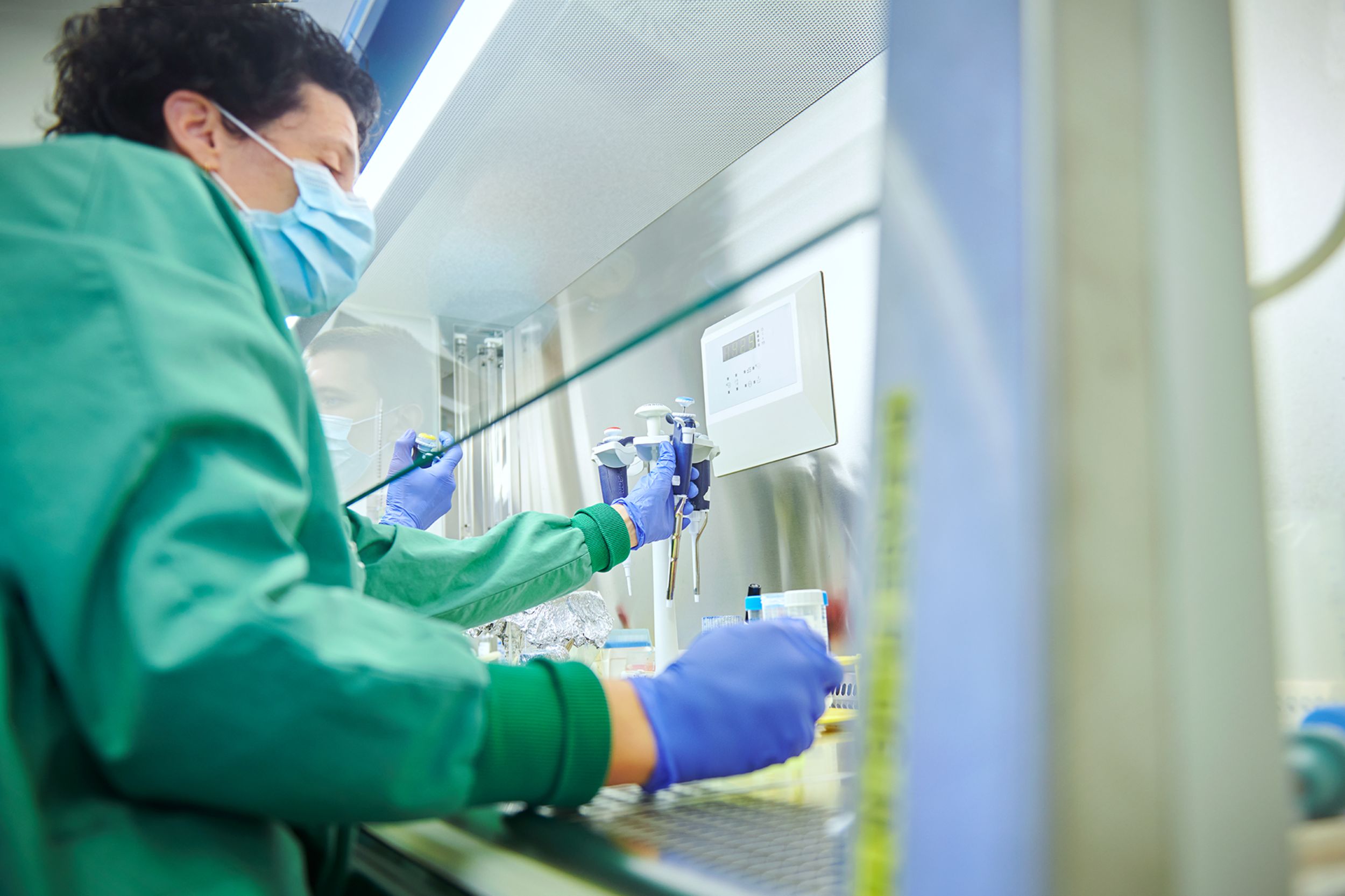
Research
Research focus of the department
Basic immunological research
The aim of basic research is to investigate fundamental biological processes. A better understanding of these processes enables the development of new therapeutic approaches on a rational basis. Our research group investigates how cells of the immune system, especially T cells, function. We pay special attention to so-called microRNAs and their role in the regulation of the immune system. We use the latest technologies such as CRISPR/Cas genome editing, investigate disease processes in animal models but also work with human cells. In the long term, we aim to test microRNAs as a therapeutic target and develop new cell therapy approaches.
https://biomedizin.unibas.ch/en/research/research-groups/jeker-lab/
Selected publications
T cells made to measure
Jeker, LT
Trillium Immunology 2018; 2(2)
Highly Efficient and Versatile Plasmid-Based Gene Editing in Primary T Cells.
Kornete M, Marone R, Jeker LT. J Immunol. 2018 Feb 14. pii: ji1701121. doi: 10.4049/jimmunol.1701121
https://www.ncbi.nlm.nih.gov/pubmed/29445007
Targeting microRNAs for immunomodulation.
Jeker LT, Marone R.Curr Opin Pharmacol. 2015 Aug;23:25-31. doi: 0.1016/j.coph.2015.05.004.
https://www.ncbi.nlm.nih.gov/pubmed/26021286
microRNA-17-92 regulates IL-10 production by regulatory T cells and control of experimental autoimmune encephalomyelitis.
de Kouchkovsky D, Esensten JH, Rosenthal WL, Morar MM, Bluestone JA, Jeker LT.
J Immunol. 2013 Aug 15;191(4):1594-605. doi: 10.4049/jimmunol.1203567.
https://www.ncbi.nlm.nih.gov/pubmed/23858035
The microRNA cluster miR-17∼92 promotes TFH cell differentiation and represses subset-inappropriate gene expression.
Baumjohann D, Kageyama R, Clingan JM, Morar MM, Patel S, de Kouchkovsky D, Bannard O, Bluestone JA, Matloubian M, Ansel KM, Jeker LT.
Nat Immunol. 2013 Aug;14(8):840-8. doi: 10.1038/ni.2642.
https://www.ncbi.nlm.nih.gov/pubmed/23812098
Swiss Transplant Cohort Study
Since May 2008, the Swiss Transplant Cohort Study (STCS) has been operating as a central system for the systematic recording and follow-up of all patients undergoing organ transplantation in a Swiss transplant center.
The STCS is a prospective, multicenter cohort study that is structured as a dynamic system and follows up patients over an open period of time.
The aims of the STCS are, among others, to investigate risks and success factors regarding the long-term outcome after transplantation as well as the long-term effects of immunosuppression. In particular, we are interested in transplant immunology, transplant-related infectious diseases, genomic factors, psychosocial factors, the occurrence of tumors and general outcome research of the various Swiss transplant programs.
In accordance with the Swiss Transplantation Act and in collaboration with the Federal Office of Public Health (FOPH), the STCS also fulfills the mandate to compile and publish reports on the outcome after transplantation. The STCS is unique in the world in that every single patient is comprehensively recorded and tracked throughout the country. This is done by comparing the data with the FOPH's Swiss Organ Allocation System (SOAS), which is used to allocate donor organs. It is important to have high-quality data that adequately reflects the complex transplantation processes and thus provides an excellent basis for competitive international research and new quality controls.
The STCS is managed by the Division of Transplantation Immunology and Nephrology and is financially supported by the transplant clinics and the Swiss National Science Foundation.
Individualized immunosuppression in kidney transplantation
To ensure that a kidney transplant is not rejected, medication is needed to suppress the recipient's immune system (=immunosuppressants). However, these drugs can have side effects, such as an increased susceptibility to infections, the development of tumors, increased blood sugar levels and high blood pressure. It is therefore an important goal to adapt immunosuppression to the individual needs of a patient. With our research, we are trying to come closer to this goal. We are pursuing various approaches:
- Determining the risk of rejection prior to transplantation
- Value of monitoring kidney transplant biopsies
- Development of urine and blood tests for early rejection diagnostics. A prospective study supported by the Swiss National Science Foundation is currently underway in this regard.
http://p3.snf.ch/project-169310 - Development of monitoring and treatment concepts for BK polyomavirus infection
Selected publications
Successful steroid withdrawal guided by surveillance biopsies - a single center experience
Wehmeier C, Hirt-Minkowski P, Amico P, Georgalis A, Hopfer H, Steiger J, Dickenmann M, Schaub S.
Clin Transplant. 2017 Dec 23. doi: 10.1111/ctr.13181.
https://www.ncbi.nlm.nih.gov/pubmed/29274236
Urinary CXCL10 chemokine is associated with alloimmune and virus compartment-specific renal allograft inflammation.
Ho J, Schaub S, Wiebe C, Gao A, Wehmeier C, Koller MT, Hirsch HH, Hopfer H, Nickerson P, Hirt-Minkowski P.
Transplantation. 2017 Sep 12. doi: 10.1097/TP.0000000000001931.
https://www.ncbi.nlm.nih.gov/pubmed/28902772
Donor Specificity but Not Broadness of Sensitization Is Associated With Antibody-Mediated Rejection and Graft Loss in Renal Allograft Recipients.
Wehmeier C, Hönger G, Cun H, Amico P, Hirt-Minkowski P, Georgalis A, Hopfer H, Dickenmann M, Steiger J, Schaub S. Am J Transplant. 2017 Aug;17(8):2092-2102. doi: 10.1111/ajt.14247.
https://www.ncbi.nlm.nih.gov/pubmed/28245084
Effects of weak/non-complement-binding HLA antibodies on C1q-binding.
Hönger G, Amico P, Arnold ML, Spriewald BM, Schaub S.
HLA. 2017 Aug;90(2):88-94. doi: 10.1111/tan.13062. Epub 2017 Jun 5.
https://www.ncbi.nlm.nih.gov/pubmed/28585289
Reducing calcineurin inhibitor first for treating BK polyomavirus replication after kidney transplantation: long-term outcomes.
Bischof N, Hirsch HH, Wehmeier C, Amico P, Dickenmann M, Hirt-Minkowski P, Steiger J, Menter T, Helmut H, Schaub S.Nephrol Dial Transplant. 2018 Nov 23. doi: 10.1093/ndt/gfy346.
https://www.ncbi.nlm.nih.gov/pubmed/30476254
We also participate in various other research projects and, where possible, supervise master's theses and dissertations in the entire field of nephrology. We look forward to hearing from interested parties.
Inquiries via email to nephro-basel@usb.ch
